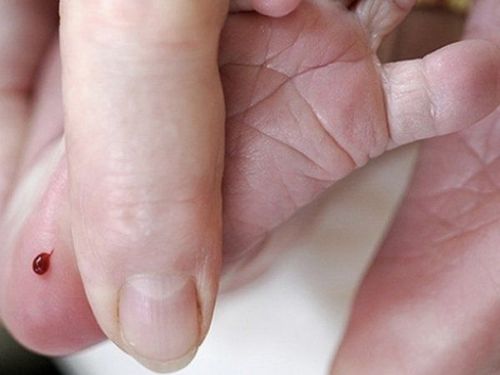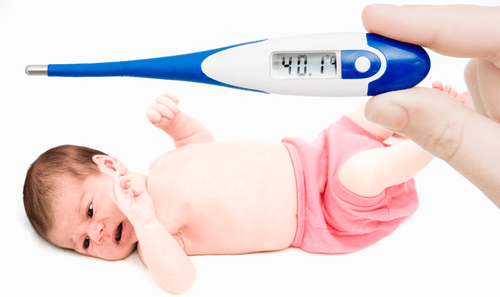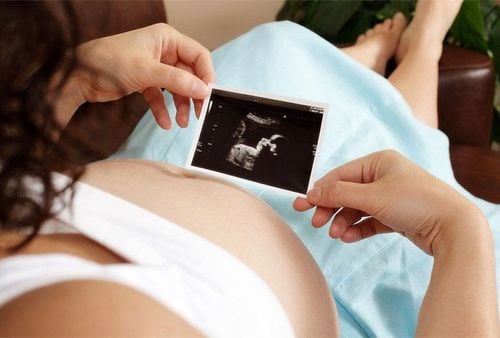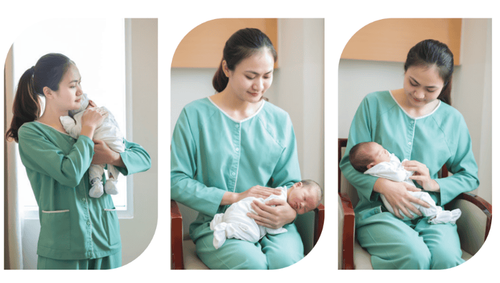This is an automatically translated article.
The article was professionally consulted by resident Doctor Duong Van Sy - Department of Pediatrics - Neonatology - Vinmec Hai Phong International General Hospital.Newborn screening test through heel blood collection is a test to help early detect newborns at risk of birth defects, diseases related to endocrine - metabolism - genetic or not. This type of screening test does not affect the health of the child.
1. Heel blood collection helps diagnose what diseases?
GPD deficiency G6PD enzyme deficiency or complete is a disease of the enzyme Glucose - 6 Phosphate Dehydrogenase. Is an inherited disease linked to the X sex chromosome.Yeast G6PD is produced by red blood cells to protect red blood cells from oxidizing agents. In the case of children with this enzyme deficiency, the red blood cells will function abnormally and be destroyed by the oxidizing substances found in foods, such as lentils, causing anemia due to hemolysis leading to yellowing. skin in infants. Boys are more likely to get the disease than girls because girls get the disease when they must have enough genes to inherit the disease from both parents. Deficiency of G6PD enzyme makes red blood cells fragile, causing hemolysis and increasing bilirubin levels. At this time, the child's liver function is incomplete and cannot metabolize all bilirubin, causing prolonged jaundice, if not treated promptly. will cause brain damage affecting intelligence. When a child is anemic, the oxygen supply is not enough for the body, leading to the child always feeling tired, slow, not agile, weak immunity,... Congenital hypothyroidism is a thyroid condition in children. Newborns do not produce or produce less hormones than normal. With the human body, thyroid hormone is especially necessary for the development of the brain and body, especially from infancy to adulthood. Children with congenital hypothyroidism without early intervention will have delayed physical and intellectual development. The risk of congenital hypothyroidism increases with very low birth weight (less than 2 kg) or very heavy (more than 4.5 kg) babies. Children with the disease may have symptoms such as less crying, very soft crying, umbilical hernia, constipation or prolonged jaundice.
Treatment of congenital hypothyroidism by supplementing the deficient thyroid hormone in the first 2 weeks after birth can help the baby develop normally.
Congenital adrenal hyperplasia In this pathology, the child has a disorder in the production of adrenal hormones. The disease can cause the baby's body to lose salt, worse, cause death, female genital virilization, early puberty in boys. Children with congenital adrenal hyperplasia cannot be cured, but hormone supplements can be used to balance and control the disease. Girls also reduce virilization when developing genitals, limiting the need to change sex or reshape the genitals. This gender-biased development, if not intervened, will greatly affect the life and psychology of children.
2. Number of drops of blood to be taken for testing
Newborn babies at the hospital after 48 hours of birth will have 2 drops of blood from the heel to be placed on absorbent paper to dry for testing.
3. How long does it take to get results after testing?
The most appropriate age for newborn screening is between 2 and 7 days old. However, when to draw blood depends on whether your baby is born full term or not. After taking the test, the results will be returned within 24-72 hours.If the screening results show that your child has the disease, the doctor will advise on the condition and guide the next steps for diagnosis, treatment or prevention.
4. Heel blood collection procedure for newborn blood test
Explain to the child's parents the benefits of taking their baby's blood for testing. Ask for personal information of the baby and family to fill out the test sheet: mother's name, baby's gender, weight, date of birth, mother's medical history, date of sample collection... Take blood draw: Baby's body You will be placed with your feet lower than yourself to have your heel blood drawn. The number of blood drops to be taken is 2 drops of blood and is placed on 2 circles of absorbent paper to dry. Preservation of blood samples: Will be allowed to dry naturally and sent to the laboratory. The test will be done to detect at least 2 diseases: G6PD deficiency and congenital hypothyroidism. Time to return test results: Within 24-48 hours. Cases of suspected illness will be notified to the family for the next course of action.
Vinmec International General Hospital provides a full range of tests to help screen early common diseases in babies. Screens at Vinmec include:
G6PD enzyme deficiency test Quantitative test of TSH , T3, T4 to diagnose congenital hypothyroidism 17-OHP test to diagnose congenital adrenal hyperplasia. The above tests are part of the Maternity package at Vinmec (except for the Hearing Screening test which is not included in the maternity package). Customers who register for Maternity Package at Vinmec will be fully tested, prenatal care - during and after birth for both mother and baby. In addition, the hospital still provides newborn screening service for customers who are not registered to give birth at Vinmec but have a need.
Please dial HOTLINE for more information or register for an appointment HERE. Download MyVinmec app to make appointments faster and to manage your bookings easily.














